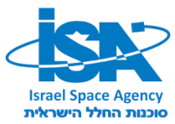Israeli Space Agency
 |
|
| Acronym | ISA |
|---|---|
| Owner |
|
| Established | 1983 (Successor agency to National Committee for Space Research 1960-1983) |
| Headquarters | Tel Aviv, Israel |
| Primary spaceport | Palmachim Airbase |
| Administrator | Professor Yitzhak Ben Yisrael (Chairman), Avi Blasberger (Director General) |
| Budget | ₪ 180 million / US$48 million |
| Website | space.gov.il |
The Israel Space Agency (ISA; Hebrew: סוכנות החלל הישראלית, Sochnut HaChalal HaYisraelit) is a governmental body, a part of Israel's Ministry of Science and Technology, that coordinates all Israeli space research programs with scientific and commercial goals.
The agency was founded by the theoretical physicist Professor Yuval Ne'eman in 1983 to replace the National Committee for Space Research which was established in 1960 to set up the infrastructure required for space missions. The agency is currently headed by Professor Isaac Ben Israel as Chairman and Avi Blasberger as Director General.
Today, Israel is the smallest country with indigenous launch capabilities.
The Israel Space Agency has history dating back to the late 1950s.
The Israeli Space Agency originated as a university-based research project from Tel-Aviv University in the early 1960s. In 1960, the National Committee for Space Research (NCSR) was formed by the Israel Academy of Sciences and Humanities. The committee was formed to increase research activities across the academic communities in Israel. While at the time establishing a space program was not particularly one of its goals, during the '60s through the late '70s, the committee developed the infrastructure needed for research and development in space exploration and sciences. One of the NCSR's earliest achievements took place in 1961 with the launch of its first two-stage rocket.
Following political tension with Egypt and Syria, reconnaissance flights became evermore difficult. In 1979, a satellite program was proposed followed by a year of feasibility study. The study was completed by late 1980; Saguy requested from prime minister Menachem Begin that the project proceed to its next phase. In 1982, a new recommendation called "Ofeq Program" was submitted for developing an observation satellite. The program included timelines, planning for a ground station, budget estimates, and personnel requirements. The primary goal was to develop a satellite program without relying on any foreign know-how, to allow flexibility and creativity. The launcher would be developed by Malam, the two engines by the Israel Military Industries (IMI), and the third by Rafael.
...
Wikipedia
